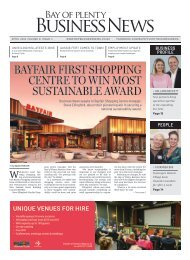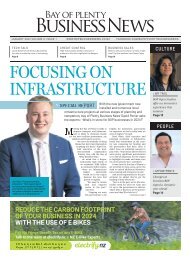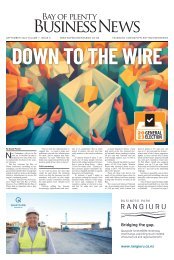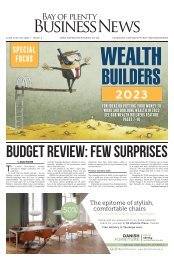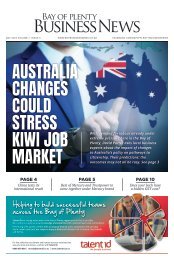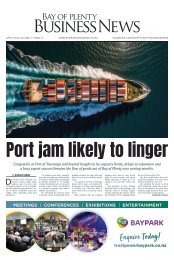April/May 2020 - BAY OF PLENTY BUSINESS NEWS
From mid-2016 Bay of Plenty businesses have a new voice, Bay of Plenty Business News. This new publication reflects the region’s growth and importance as part of the wider central North Island economy.
From mid-2016 Bay of Plenty businesses have a new voice, Bay of Plenty Business News. This new publication reflects the region’s growth and importance as part of the wider central North Island economy.
You also want an ePaper? Increase the reach of your titles
YUMPU automatically turns print PDFs into web optimized ePapers that Google loves.
<strong>April</strong>/<strong>May</strong> <strong>2020</strong> <strong>BAY</strong> <strong>OF</strong> <strong>PLENTY</strong> <strong>BUSINESS</strong> <strong>NEWS</strong> 15<br />
Covid-19<br />
– Market<br />
contagion?<br />
Market Update (Please note this column<br />
was prepared on 17 March, <strong>2020</strong>)<br />
In the last few weeks global<br />
sharemarkets have substantially<br />
retraced their early<br />
momentum for the month of<br />
January and the latter stages of<br />
last year.<br />
In the early period of the<br />
Covid-19 outbreak, financial<br />
markets seemed to blissfully<br />
ignore the progression of the<br />
virus. However, we are now<br />
in a period of daily market<br />
volatility as investors gauge<br />
the flow-on economic impacts<br />
and whether the recent sell-off<br />
presents buying opportunities.<br />
The catalyst for the sell-off<br />
has been two-fold.<br />
Firstly, the progression of<br />
With further rate cuts being implemented by<br />
Central Banks to try and curb the impact of<br />
Covid-19, low interest rates will be the norm<br />
for the immediate future.<br />
the virus outside of China and<br />
secondly, a steady stream of<br />
companies beginning to downgrade<br />
forecast earnings.<br />
The initial outbreak of the<br />
virus in China caused a major<br />
disruption to international supply<br />
chains, although the situation<br />
in that country seems to be<br />
improving.<br />
Perhaps the biggest factor<br />
in market performance over<br />
the next three to six months<br />
will be the as yet unknown impact<br />
on company earnings.<br />
It is possible we will see a<br />
rally if the spread of the virus<br />
can be contained, followed by<br />
dips as the market reacts to further<br />
earnings downgrades.<br />
All of this uncertainly begs<br />
the question: “How should we<br />
react?”<br />
Turbulent markets always<br />
make us feel like we should<br />
“do” something. Sometimes<br />
(like the 2008 financial crisis),<br />
we should. However, often sitting<br />
back and monitoring the<br />
situation is the best option. We<br />
think that is the case now.<br />
Since 2008 there have been<br />
19 sell-offs greater than five<br />
percent. The current downturn<br />
WHAT TO DO WITH YOUR MONEY<br />
> BY BRETT BELL-BOOTH<br />
Investment Adviser with Forsyth Barr Limited in Tauranga, and<br />
an Authorised Financial Adviser. Phone (07) 577 5725 or<br />
email brett.bell-booth@forsythbarr.co.nz.<br />
is now classified as a bear market,<br />
having retraced more than<br />
20 percent from its peak (at the<br />
time of writing, the sharemarket<br />
was down 21 percent.<br />
Every sell-off is serious –<br />
from Greece teetering on the<br />
brink of complete collapse, to<br />
the US Government sovereign<br />
downgrade in 2011.<br />
However, since December<br />
2008, the US sharemarket has<br />
risen well over 200 percent,<br />
excluding dividends. In other<br />
words, reacting to a crisis by<br />
selling shares is often a poor<br />
decision.<br />
The extent of market contagion<br />
relative to the level of<br />
viral contagion is determined<br />
by a combination of investor<br />
sentiment and factual information.<br />
An objective evaluation<br />
of your investment goals will<br />
ensure that your portfolio is<br />
well-positioned to weather any<br />
potential storm.<br />
As has been the theme in<br />
recent years, low interest rates<br />
continue to limit options for<br />
investors.<br />
With further rate cuts being<br />
implemented by Central Banks<br />
to try and curb the impact of<br />
Covid-19, low interest rates<br />
will be the norm for the immediate<br />
future. Whether you are<br />
an existing investor or considering<br />
an investment in the capital<br />
markets for the first time,<br />
get in touch with Forsyth Barr.<br />
Source: Forsyth Barr Focus,<br />
Special Report, February<br />
<strong>2020</strong>.<br />
This column is general in nature<br />
and is not personalised investment<br />
advice. This column<br />
has been prepared in good<br />
faith based on information obtained<br />
from sources believed<br />
to be reliable and accurate.<br />
Disclosure Statements for Forsyth<br />
Barr Authorised Financial<br />
Advisers are available on<br />
request and free of charge.<br />
Making sense<br />
of COVID-19<br />
Committed to supporting<br />
our community and clients<br />
during this challenging<br />
and uncertain time.<br />
WAVE25599<br />
Young Read Woudberg Limited<br />
13 McLean Street, Tauranga 3110<br />
12A Oxford Street, Te Puke 3119<br />
P 07 578 0069 E accountants@yrw.co.nz<br />
W www.yrw.co.nz



